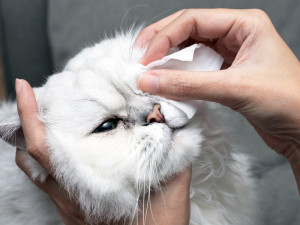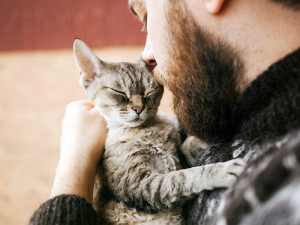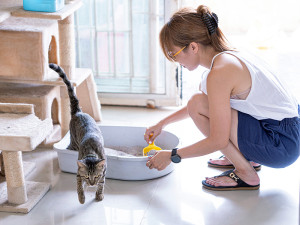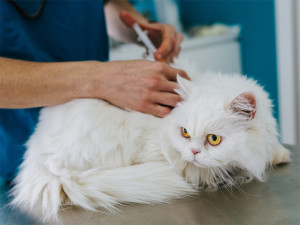
Share Article
In This Article:
What Is Feline Herpes? What Are Symptoms of Feline Herpes? How Are Cats Infected with Feline Herpes? How to Treat Feline Herpes How to Prevent Infection of Feline Herpes
Yes, cat herpes is real, but fear not: Most of the time it causes cold-like symptoms that resolve within a few weeks. And while many people associate herpes with the sexually transmitted infection in humans, the herpesvirus of cats is a completely different disease that has nothing to do with sex or reproductive organs.
It is extremely common among cats, and most cat parents will encounter it at some point. Read on to learn all about herpes in cats.
What is feline herpes?
Feline herpes is a virus technically known as feline herpesvirus 1 (FHV-1) and is sometimes referred to as feline viral rhinotracheitis. All herpes viruses share some common characteristics, including the shape of the virus and an ability to replicate quickly. Plus, it has a way of hiding out in nerve cells, allowing signs to resolve but leading to reactivation of the virus later in life.

In cats, feline herpesvirus causes an upper-respiratory-tract infection, meaning that it causes cold-like signs. The signs usually resolve within three weeks, but it is important to know that all cats who have had herpes virus can develop signs again in the future if the virus becomes reactivated.
What are the symptoms of feline herpes?
The most common symptoms of feline herpes are cold-like signs and conjunctivitis. This includes:
Sneezing: Cats with herpesvirus often sneeze frequently in addition to other signs of a respiratory infection.
Nasal discharge and congestion: Herpesvirus causes a lot of nasal congestion, and many cats will have nasal discharge that can range from clear to yellow to green mucus.
Fever: Some cats will also develop a fever when they have a herpesvirus infection, which can make them act more tired and withdrawn.
Changes to eyes: Cats with herpesvirus often develop conjunctivitis, which results in red, painful eyes, swelling of the eyelids, excessive tearing or discharge from the eyes.
Loss of appetite: The combination of fever, painful eyes, and nasal congestion often leads to a decreased appetite for cats with herpesvirus infections. Cats rely on their sense of smell to enhance the taste of their food so if they are very congested, they may not want to eat, in addition to not feeling well overall.
Lethargy: Lethargy may result from a combination of not feeling well, fever, not eating, or becoming dehydrated.
Coughing: Some cats can develop lower respiratory signs with more serious herpesvirus infections. This can lead to coughing, pneumonia, or difficulty breathing. Any cat with difficulty breathing needs to see a vet right away.
How is feline herpes diagnosed?
Most of the time, herpes is diagnosed based on the symptoms and history of the sick cat. Herpes is a common cause of respiratory infections, especially in young, unvaccinated kittens as well as in cats from crowded living conditions, like animal shelters and catteries. Your vet may suspect herpesvirus if your cat fits this profile.
There are other possible causes for respiratory infections in cats, and usually you won’t know for sure which one your cat has. The good news is that most are self-limiting, meaning that regardless of the specific cause, they will resolve within a few weeks with basic supportive care. In cases that are more severe or not resolving after a few weeks, your vet may recommend more specific diagnostic tests, such as a respiratory panel PCR to test for different infectious agents and further target the ongoing treatments.
How are cats infected with feline herpes?
Herpes virus is spread from cat to cat in fluid droplets from the eyes, nose, or mouth. This requires cats to be in close-enough contact for the droplets to spread directly from one cat to the next. Infections can also be spread on infected materials like fabrics, food bowls, toys, and humans’ clothing.
Once a cat is infected with the virus, they will have it for life. In cats with strong immune systems, their signs usually resolve completely within a few weeks, however, the virus can reactivate at any point throughout their life. Typically, the virus is more likely to reactivate when the cat’s immune system is weakened, which may occur from other illnesses, medications, old age, or stress.
How long is a cat infectious after getting feline herpes?
Cats may shed the virus for up to three weeks after becoming infected. To be safe, it is best to assume that any cat with active signs of a respiratory infection could be contagious and should be separated from other cats for at least a three-week period. When the virus is latent, meaning a cat has no signs of illness, the cat is not infectious. Cats who have a reactivation of their herpesvirus in the future can also shed the virus while they have active signs of the infection.
Are other cats in the household at risk of infection?
Yes, the herpes virus is highly contagious between cats. Any new cat that comes into the home should be isolated for at least three weeks to ensure they are not going to break with signs of a respiratory infection. Many adult cats may have already been exposed to the virus since it is so common, and cats who are up-to-date on their core vaccines will also be protected from infection.
What can be confusing is that sometimes, a stressful event like a move, introduction of a new pet, or construction in the home sets off reactivation of the herpesvirus in multiple cats at the same time. It may seem like the cats got sick from each other but it is also possible that they simply all experienced the same upsetting event and this caused their signs to recur.
How to treat feline herpes
Most cat colds resolve with time and TLC. Cats with healthy immune systems can fight the virus and their signs should resolve within three weeks. When they are feeling sick, it can help to reduce stress and take measures to alleviate their symptoms. You can steam-up a bathroom during a hot shower and have your cat hang out in there to reduce nasal congestion.
If your cat is not eating with gusto, try warming up their food and offering a variety of options to tempt them to eat. Cats who develop eye problems — like squinting, eye discharge, or swelling of their eyes — should see a vet for medication to treat conjunctivitis, aka pink eye.
Some cats may need more intensive supportive care if they are not eating, have a fever, or become dehydrated. This may include fluid therapy provided under the skin or through a vein. Other treatments may include medications to stimulate their appetite and reduce nausea, nebulization, antibiotics to fight secondary bacterial infections, and/or antivirals to shorten the course of the infection.
How to prevent infection from feline herpes virus
Feline herpesvirus is very prevalent and many cats will be exposed to the virus before they even reach your home. This is especially common in stray cats, as well as cats who come from animal shelters, catteries, or other crowded situations. Therefore, don’t blame yourself if your cat gets sick from herpesvirus. At the same time, there are many proactive measures you can take to protect your cat including:
Vaccination: One of the core vaccines for cats protects them against feline herpesvirus. This combination vaccine, commonly known as FVRCP, includes vaccines against feline viral rhinotracheitis (aka herpes), as well as calicivirus, and panleukopenia. Kittens should begin their vaccine series as early as possible once they are weaned from their mothers, typically around six to eight weeks old. Orphaned kittens are sometimes vaccinated as early as four weeks old because they miss out on protective antibodies from their mother’s milk. Kittens who have not been vaccinated should be kept indoors and away from all other animals until they have had their vaccines.
Isolate infected cats and new cats: If you bring a new cat or kitten into your home, be sure to isolate them from your other pets for at least three weeks, even if they don’t have any signs of illness. Sometimes, the stress of being in a new home can cause the herpesvirus to reactivate and your new cat or kitten may begin showing signs after a few days in your home. Any cat with active signs of a respiratory infection should also be isolated from other cats in the home until you know more about their illness.
Clean areas where an infected cat has been: Be sure to thoroughly clean the spaces where an infected cat has been. This includes fabrics, food bowls, litter boxes, beds, and hard surfaces. If you are caring for both infected and healthy cats, you should wear gloves when handling the sick cat and change your clothes before coming into contact with healthy cats.
Create a healthy cat lifestyle: Due to the fact that the herpesvirus can reactivate throughout a cat’s life, it is important to promote healthy habits for your cats to reduce the risk of reactivation. This means minimizing stress, providing daily exercise and enrichment, ensuring they eat a healthy diet, and keeping up with routine vet care, vaccines, and other preventative health measures.
Bottom line
Feline herpesvirus is a common cause of respiratory infections and conjunctivitis in cats.
This virus is highly contagious between cats and can reactivate in cats years after their initial infection.
There are many effective ways to prevent feline herpesvirus as well as to treat cats who develop the infection.
Most of the time, illness from herpesvirus resolves within three weeks.
References
Coster, M. “Feline Herpesvirus: Therapeutic Review.opens in new tab” MSPCA-Angell, Updated 2025.
Ozkanlar, Y, et al. “Clinical evaluation of antiviral combination treatment in cats with feline herpesvirus-1 infectionopens in new tab.” Pol J Vet Sci, vol. 26, no. 4, 12 December 2023, pp. 705-713.
Thiry, E, et al. “Feline Herpesvirus Infection: ABCD Guidelines on Prevention and Managementopens in new tab.” Journal of Feline Medicine and Surgery, vol. 11, no. 7, 1 July 2009, pp. 547-555.

Dr. Amy Fox, DVM
Amy Fox, DVM is a small animal veterinarian in New York City with over thirteen years of experience in a mixture of general practice, emergency medicine, and shelter medicine. A lifelong animal lover, Dr. Fox studied biology in college and then worked as a veterinary nurse before pursuing veterinary school at Cornell University. Her expertise includes surgery, dentistry, and management of chronic conditions, and she is interested in toxicology, pain management, nutrition, care of senior pets, and educational outreach. Dr. Fox also enjoys writing about veterinary medicine and teaching, and her work has previously appeared in Spruce Pets. In her free time, she loves to cook, garden, go for long runs, and hang out with her goofy mixed-breed dog May, who provides never ending comic relief!
Related articles
![Cat playing and jumping with a rubber band]()
What’s the Deal with FIV in Cats?
The most common questions about feline immunodeficiency virus, answered. Good news: most cats live long, happy lives.
Can Cats Get Parvo? The Symptoms, Treatment, and Dangers
Learn about “feline parvovirus” and the symptoms you should watch for.
Why Does My Cat Have Diarrhea?
Let’s try to, erm, firm up the details.
Can Cats Get Kennel Cough From Dogs?
The answer isn’t fun, but you can prevent this.
![Young person veterinarian in their veterinary clinic performing a medical examination on a pet.]()
What to Know About Rabies in Cats
There is one way to make sure your cat stays safe: vaccinate, vaccinate, vaccinate.






